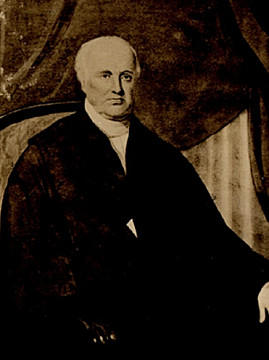William Dummer Powell (1755-1834)
The Hon. William Dummer Powell, Chief Justice of Upper Canada
He was born in Boston, Massachusetts. He was educated first at the Boston Free Grammar School before being sent to England. He studied at Tonbridge School in Kent before spending two years in Rotterdam learning French and Dutch. Returning to England he, “cultivated the good graces of the ladies more than any other pursuit,” which prompted his father to recall him to Boston in 1772. There, he studied law in the offices of Jonathan Sewell, the last Colonial Attorney-General of Massachusetts before returning to London in 1776 when he was admitted to the Middle Temple.
After the Revolution he practiced in Montreal before becoming a judge at Detroit. In 1794, he was appointed to the Court of King's Bench for Upper Canada at Newark and in 1808 he settled at York (Toronto) on his election to the Executive Council of Upper Canada. At the same time, he sold his estate outside Montreal to Sir James Monk who built Monklands there. When York was occupied during the War of 1812 he opposed the suspension of Habeas Corpus. In 1814, he assisted Chief Justice Scott with the "Bloody Assize" and prosecuted several of those charged with treason. Two years later, Powell succeeded Scott as Chairman of the Executive Council and Chief Justice of Upper Canada. He was forced to resign from both posts in 1825 for exposing the Council to criticism. He married Anne Murray, had 8-children and lived at "Caer Howel" on York Street, Toronto.
After the Revolution he practiced in Montreal before becoming a judge at Detroit. In 1794, he was appointed to the Court of King's Bench for Upper Canada at Newark and in 1808 he settled at York (Toronto) on his election to the Executive Council of Upper Canada. At the same time, he sold his estate outside Montreal to Sir James Monk who built Monklands there. When York was occupied during the War of 1812 he opposed the suspension of Habeas Corpus. In 1814, he assisted Chief Justice Scott with the "Bloody Assize" and prosecuted several of those charged with treason. Two years later, Powell succeeded Scott as Chairman of the Executive Council and Chief Justice of Upper Canada. He was forced to resign from both posts in 1825 for exposing the Council to criticism. He married Anne Murray, had 8-children and lived at "Caer Howel" on York Street, Toronto.









